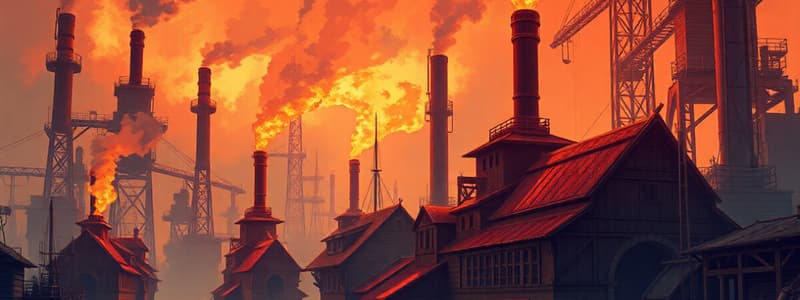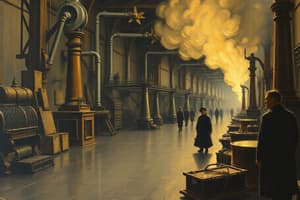Podcast
Questions and Answers
What does the term 'laissez faire' mean?
What does the term 'laissez faire' mean?
- Let governments control business affairs
- Let unions enforce working conditions
- Let do as one pleases (correct)
- Let workers decide their own wages
Capitalism promotes government regulation of the market.
Capitalism promotes government regulation of the market.
False (B)
What was the main goal of labor unions formed during the Industrial Revolution?
What was the main goal of labor unions formed during the Industrial Revolution?
To increase workers' rights and protections.
The economic system where private owners control the resources and production is known as __________.
The economic system where private owners control the resources and production is known as __________.
Match the economic terms with their definitions:
Match the economic terms with their definitions:
What was a significant consequence of the Industrial Revolution?
What was a significant consequence of the Industrial Revolution?
Socialism argues for government intervention to manage the economy.
Socialism argues for government intervention to manage the economy.
Who are the two key philosophers associated with capitalism and socialism?
Who are the two key philosophers associated with capitalism and socialism?
What did Adam Smith believe about individuals following their own self-interest?
What did Adam Smith believe about individuals following their own self-interest?
Ricardo believed that wages would rise as population increased.
Ricardo believed that wages would rise as population increased.
Who are the laissez-faire thinkers mentioned in the content?
Who are the laissez-faire thinkers mentioned in the content?
In a market system with __________ workers and __________ resources, labor and resources are cheap.
In a market system with __________ workers and __________ resources, labor and resources are cheap.
What was one of the key beliefs of Malthus and Ricardo regarding government intervention?
What was one of the key beliefs of Malthus and Ricardo regarding government intervention?
What concept did Smith describe as guiding the market towards social harmony?
What concept did Smith describe as guiding the market towards social harmony?
Match the following thinkers with their beliefs:
Match the following thinkers with their beliefs:
Smith engaged in charitable donations despite his laissez-faire beliefs.
Smith engaged in charitable donations despite his laissez-faire beliefs.
Who modified the ideas of Adam Smith to introduce utilitarianism?
Who modified the ideas of Adam Smith to introduce utilitarianism?
John Stuart Mill supported the idea of unregulated capitalism.
John Stuart Mill supported the idea of unregulated capitalism.
What major societal change did Alexis de Tocqueville warn about?
What major societal change did Alexis de Tocqueville warn about?
According to Jeremy Bentham, the government should promote the greatest good for the _____ number of people.
According to Jeremy Bentham, the government should promote the greatest good for the _____ number of people.
Match the following thinkers with their contributions:
Match the following thinkers with their contributions:
What did John Stuart Mill advocate for in terms of wealth distribution?
What did John Stuart Mill advocate for in terms of wealth distribution?
What did utilitarians push for reforms in, aside from the economic system?
What did utilitarians push for reforms in, aside from the economic system?
Utilitarianism focuses on judging actions based on their utility and usefulness.
Utilitarianism focuses on judging actions based on their utility and usefulness.
According to the content, which of the following factors are stated to influence history alongside economic forces?
According to the content, which of the following factors are stated to influence history alongside economic forces?
The gap between the rich and the poor in industrialized countries widened as predicted by Marx and Engels.
The gap between the rich and the poor in industrialized countries widened as predicted by Marx and Engels.
What was the purpose of labor unions during the Industrial Revolution?
What was the purpose of labor unions during the Industrial Revolution?
Marx and Engels believed that _____ alone dominated society.
Marx and Engels believed that _____ alone dominated society.
Match the following terms with their correct descriptions:
Match the following terms with their correct descriptions:
Which statement best reflects the situation of factory workers in the 1800s?
Which statement best reflects the situation of factory workers in the 1800s?
At the peak of Communist expansion during the 1980s, many nations had communist governments.
At the peak of Communist expansion during the 1980s, many nations had communist governments.
What significant changes in worker rights were achieved through union actions?
What significant changes in worker rights were achieved through union actions?
What term refers to the middle class according to Marx and Engels?
What term refers to the middle class according to Marx and Engels?
Marx believed that the working class had a distinct country they could claim.
Marx believed that the working class had a distinct country they could claim.
What was the primary purpose of The Communist Manifesto?
What was the primary purpose of The Communist Manifesto?
Marx and Engels argued that the __________ controlled the means of producing goods.
Marx and Engels argued that the __________ controlled the means of producing goods.
Match the following terms with their definitions:
Match the following terms with their definitions:
Which of the following statements about Marx's theories is true?
Which of the following statements about Marx's theories is true?
Friedrich Engels financially supported Karl Marx in his work.
Friedrich Engels financially supported Karl Marx in his work.
What did Marx mean by 'oppressor and oppressed'?
What did Marx mean by 'oppressor and oppressed'?
What significant establishment did Jane Addams and Ellen Starr set up in Chicago?
What significant establishment did Jane Addams and Ellen Starr set up in Chicago?
By the 1850s, public school systems were already established in many states.
By the 1850s, public school systems were already established in many states.
What did early socialists aim to create in society?
What did early socialists aim to create in society?
Adam Smith is associated with the principles of _______ economics.
Adam Smith is associated with the principles of _______ economics.
Match the following economic theories with their key proponents:
Match the following economic theories with their key proponents:
What was one of Adam Smith's natural laws of economics?
What was one of Adam Smith's natural laws of economics?
Workers joined together in unions primarily to fight for better wages and working conditions.
Workers joined together in unions primarily to fight for better wages and working conditions.
What were the main problems faced by unions during the 1800s?
What were the main problems faced by unions during the 1800s?
Flashcards
Capitalism
Capitalism
An economic system in which individuals and companies own the means of production, and the goal is to make a profit.
Socialism
Socialism
An economic system in which the government owns or controls most of the means of production, and aims to distribute wealth more equally.
Laissez-faire
Laissez-faire
The idea that the government should not interfere in the economy, allowing businesses to operate freely.
Adam Smith
Adam Smith
Signup and view all the flashcards
Karl Marx
Karl Marx
Signup and view all the flashcards
Communism
Communism
Signup and view all the flashcards
Union
Union
Signup and view all the flashcards
Strike
Strike
Signup and view all the flashcards
Effect of Labor and Resources on Price
Effect of Labor and Resources on Price
Signup and view all the flashcards
Ricardo's View on Population and Wages
Ricardo's View on Population and Wages
Signup and view all the flashcards
Laissez-Faire Philosophy and Government Intervention
Laissez-Faire Philosophy and Government Intervention
Signup and view all the flashcards
Smith's 'Invisible Hand' Theory
Smith's 'Invisible Hand' Theory
Signup and view all the flashcards
Socialism vs. Laissez-Faire
Socialism vs. Laissez-Faire
Signup and view all the flashcards
Labor Union
Labor Union
Signup and view all the flashcards
Collective Bargaining
Collective Bargaining
Signup and view all the flashcards
Industrial Revolution
Industrial Revolution
Signup and view all the flashcards
Economic Determinism
Economic Determinism
Signup and view all the flashcards
Laissez-faire Capitalism
Laissez-faire Capitalism
Signup and view all the flashcards
Wealth Inequality
Wealth Inequality
Signup and view all the flashcards
Utilitarianism
Utilitarianism
Signup and view all the flashcards
Alexis de Tocqueville
Alexis de Tocqueville
Signup and view all the flashcards
John Stuart Mill
John Stuart Mill
Signup and view all the flashcards
Jeremy Bentham
Jeremy Bentham
Signup and view all the flashcards
Government intervention
Government intervention
Signup and view all the flashcards
What is Marxism?
What is Marxism?
Signup and view all the flashcards
Who are the bourgeoisie?
Who are the bourgeoisie?
Signup and view all the flashcards
Who are the proletariat?
Who are the proletariat?
Signup and view all the flashcards
What is the inevitable revolt?
What is the inevitable revolt?
Signup and view all the flashcards
What is The Communist Manifesto?
What is The Communist Manifesto?
Signup and view all the flashcards
How did the Industrial Revolution contribute to the conflict?
How did the Industrial Revolution contribute to the conflict?
Signup and view all the flashcards
How did Marx view history?
How did Marx view history?
Signup and view all the flashcards
Why is there conflict between the bourgeoisie and the proletariat?
Why is there conflict between the bourgeoisie and the proletariat?
Signup and view all the flashcards
Study Notes
Reforming the Industrial World
- The Industrial Revolution created a large gap between the rich and poor in the 19th century.
- Business leaders favored a hands-off approach (laissez-faire) to business and economics.
- Reformers believed the government should intervene to help the poor.
- Workers organized labor unions to improve their rights and working conditions.
Philosophies of Industrialization
- Laissez-faire economics, meaning "let do," allows business owners to set their own working conditions without government interference.
- Laissez-faire economics arose from Enlightenment philosophers who criticized government regulations on trade.
- Adam Smith, a Scottish economist, advocated for a free market economy in his 1776 book The Wealth of Nations.
- Smith argued that self-interest, competition, and supply and demand regulate the economy.
Capitalism
- Capitalism is an economic system where individuals and businesses own the means of production.
- The goal is to make a profit.
- Adam Smith's ideas formed the foundation of laissez-faire capitalism.
- Thomas Malthus and David Ricardo expanded on Smith's ideas about natural laws governing economic life.
Socialism
- Socialism is an economic system where the means of production are owned by the community or the state.
- The goal is to distribute wealth and resources more equally.
- Social reformers like Charles Fourier, Saint-Simon, and Louis Blanc advocated for socialism to reduce the negative impacts of industrialization.
- These reformers believed the government should plan the economy, not just let the free market do it.
Marxism
- Karl Marx and Friedrich Engels introduced a radical form of socialism called Marxism.
- Marx believed that history is driven by class struggle between the bourgeoisie (owners) and the proletariat (workers).
- They predicted a worker uprising and the eventual establishment of a communist society.
Labor Unions
- Workers formed unions to bargain for better working conditions, wages, and rights.
- Unions used strikes to put pressure on employers.
- The British government initially opposed unions but eventually began to tolerate them.
- Unions in the U.S developed, contributing to labor reforms.
Reform Laws
- Many reform laws emerged to address the abuses of workers in factories.
- The Ten Hours Act in Britain and child labor laws in the U.S. and Britain aimed to protect workers.
- Other reforms focused on education, prison systems, and abolition of slavery.
Women's Rights
- Women played a significant role in the reform movements.
- Women's rights advocates worked towards equality and fair treatment.
Studying That Suits You
Use AI to generate personalized quizzes and flashcards to suit your learning preferences.




